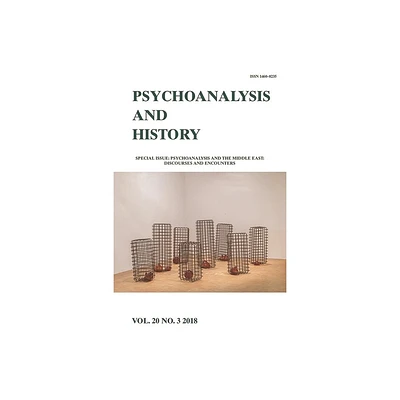Home
A Brief Apocalyptic History of Psychoanalysis: Erasing Trauma
Loading Inventory...
Barnes and Noble
A Brief Apocalyptic History of Psychoanalysis: Erasing Trauma
Current price: $160.00


Barnes and Noble
A Brief Apocalyptic History of Psychoanalysis: Erasing Trauma
Current price: $160.00
Loading Inventory...
Size: Hardcover
*Product Information may vary - to confirm product availability, pricing, and additional information please contact Barnes and Noble
A Brief Apocalyptic History of Psychoanalysis
returns us to the birth of psychoanalysis and the trauma of castration that is its umbilicus.
The story told in this book centers on the genital mutilation endured in her childhood by Emma Eckstein, Freud’s most important patient in his abandonment of the “seduction theory.” For both cultural and personal reasons, Freud could not recognize the traumatic nature of this “
Beschneidung
” (circumcision), which nevertheless aroused in him deep anguish, conflating his own circumcision, the echoes of a violently anti-Semitic environment, and conflicts with his father. Taking Freud’s countertransference to Eckstein’s trauma into account leads to a radically different understanding of the origins of psychoanalysis from the one based on the solipsistic perspective of his self-analysis. Carlo Bonomi argues that the unacknowledged trauma of circumcision was inscribed in Freud’s system of thinking as an amputated legacy from which the dreams and fantasies of his closest disciples would germinate and bloom. In particular, Sándor Ferenczi, Freud’s pupil and confidant, would help to restore this wounded body, thereby laying a new foundation for psychoanalytic theory and practice.
Bonomi’s “apocalyptic” narrative will expand the conceptual horizons of psychoanalysts and psychoanalytic psychotherapists, historians of psychoanalysis, and scholars of both gender studies and Jewish studies.
returns us to the birth of psychoanalysis and the trauma of castration that is its umbilicus.
The story told in this book centers on the genital mutilation endured in her childhood by Emma Eckstein, Freud’s most important patient in his abandonment of the “seduction theory.” For both cultural and personal reasons, Freud could not recognize the traumatic nature of this “
Beschneidung
” (circumcision), which nevertheless aroused in him deep anguish, conflating his own circumcision, the echoes of a violently anti-Semitic environment, and conflicts with his father. Taking Freud’s countertransference to Eckstein’s trauma into account leads to a radically different understanding of the origins of psychoanalysis from the one based on the solipsistic perspective of his self-analysis. Carlo Bonomi argues that the unacknowledged trauma of circumcision was inscribed in Freud’s system of thinking as an amputated legacy from which the dreams and fantasies of his closest disciples would germinate and bloom. In particular, Sándor Ferenczi, Freud’s pupil and confidant, would help to restore this wounded body, thereby laying a new foundation for psychoanalytic theory and practice.
Bonomi’s “apocalyptic” narrative will expand the conceptual horizons of psychoanalysts and psychoanalytic psychotherapists, historians of psychoanalysis, and scholars of both gender studies and Jewish studies.


















